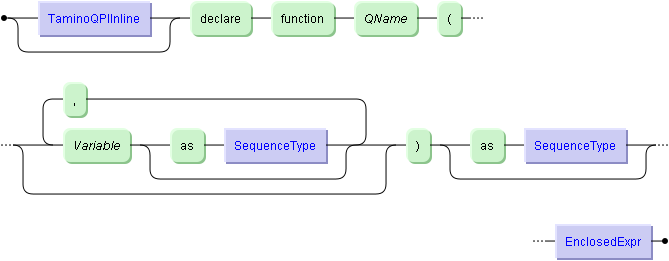Declare a user-defined function.

A FunctionDecl is part of a prolog. It declares a
user-defined function by specifying its name, a parameter list and the optional
result type. The enclosed expression is called the function body. The
parameter list is enclosed in parentheses and comprises a comma-separated list
of parameters with their names and optional types. The scope of the function
parameters is the function body. A parameter name may appear only once in the
function declaration.
The type information is optional: If a parameter is specified without a
type then the default type item* is used. If the type of the
result value is not specified, again item* is used. If you specify
a type, you can use one of the following XQuery types as parameter or return
types: all simple types, item, node,
attribute, comment, document,
element, processing-instruction, and
text. This also means that you cannot use a user-defined type as
return or parameter type.
Every function must be in a namespace, that is every declared function name must have a non-empty namespace URI. Every function name declared in a library module must be in the target namespace of the library module. However, in a main module you can declare functions for local use without defining a new namespace. For this purpose, the namespace preceded by the URI local is predeclared and bound to http://www.w3.org/2004/07/xquery-local-functions.
Function declarations may be recursive. Also, mutually recursive functions are allowed, that is, functions whose bodies reference each other.
Furthermore, you can prepend the query directive
TaminoQPIInline to
affect the way this function is optimized by the query processor.
This recursive function returns the depth of the current node on the element axis.
module namespace tree="http://www.examples.com/tree"
declare function tree:depth($e as node()) as xs:integer
{
if (not($e/*))
then
1
else
max(for $c in $e/* return tree:depth($c)) + 1
}
This function declaration is part of a library module. In order to use it directly in a main module instead, drop the module declaration and use the namespace prefix "local" instead of "tree".
The following construct(s) refer to this construct: